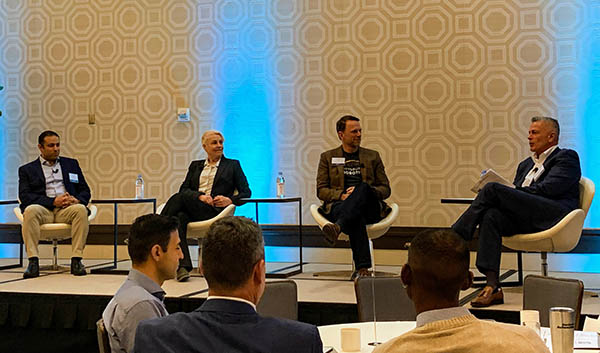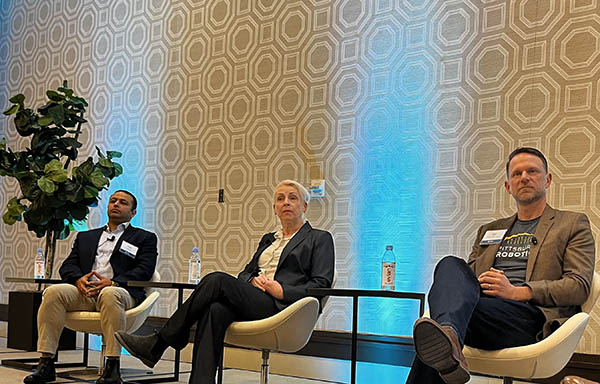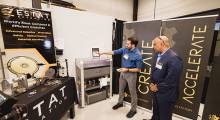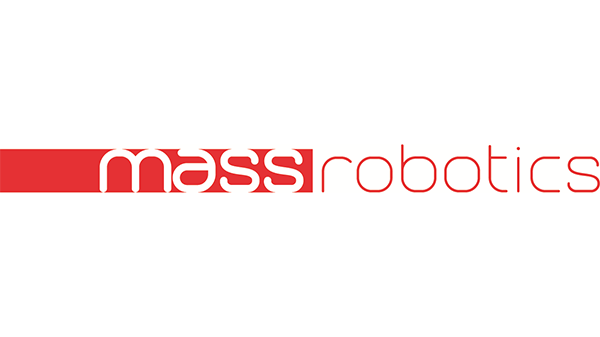PITTSBURGH—At the Cascadia Connect robotics and automation conference yesterday, three of the top robotics cluster organizations in the U.S. announced that they are forming an alliance.
MassRobotics, the Pittsburgh Robotics Network (PRN), and Silicon Valley Robotics (SVR) are forming the United States Alliance of Robotics Clusters (USARC). With the increased collaboration, the organizations said they will use one another's resources to work with government and industry leaders to promote and support innovation in the automation space.
“We want to advocate on behalf of the robotics industry,” said Andra Keay, managing director of SVR, in a panel discussion with Fady Saad, co-founder of MassRobotics, and Joel Reed, executive director of PRN.
The trio were part of a panel moderated by Michael Butler, chairman and CEO of Cascadia Capital. The organizations said business has been great for each of them the past decade, claiming they have “realized tenfold growth” in the number of companies they serve.
U.S. has strength in R&D, investments
“The U.S. robotics industry represents the fastest region for growth and activity in the world,” the new alliance said in a release. “In 2021, robotics and automation investment in the U.S. exceeded $20 billion, 60% of the global investment total.”
The alliance also noted that 28% of robotic startup investment deals in the U.S. involve early-stage companies.
“USARC will amplify the collective voice of our industry, innovative startups, partners, and stakeholders with a goal of securing ever-increasing engagement with academia, government, and industry to support U.S. robotics leadership,” said Tom Ryden, executive director of MassRobotics, in the release.
Robotics companies expand beyond clusters
The three organizations serve as robotics networking and research hubs for dozens of companies within their respective regions. Silicon Valley Robotics was formed in 2010 and is located in Oakland, Calif.
Boston-based MassRobotics was formed in 2015, while the Pittsburgh Robotics Network was formed in 2016.
“A lot of companies, very large companies, are headquartered here in Pittsburgh, but they have offices in the Bay Area, Texas, and in other parts of the country,” said Reed.“We are working together to find out what our commonalities are, but also to accentuate our strengths as well and be able to help each other.”
Echoing Reed's point, Keay said clusters forming in Texas, Atlanta, and other parts of the country have reached out to her seeking advice as robotics companies within the Silicon Valley cluster expand nationwide.
“Our companies are growing, and they are moving beyond one region,” she said.
“We have to let people know how great we are and the range of robotics companies we are developing here,” she added. “Working together, we will being doing a much better job of telling that story.”
Saad said when MassRobotics was asked to join the alliance, it was “a no-brainer” decision because it would give more support to Boston companies looking to expand.
The partnership could also help the organizations serve on a united front in advocating and discussing federal policies about technologies such as self-driving cars and drones, he noted.

Alliance could help strengthen supply chains
Reed said one of the early discussions about forming the alliance focused on bolstering supplier networks and bringing manufacturing back into local communities.
Keay said that five years ago, a lot of companies in the Bay Area were manufacturing in China. Today, she said the majority are manufacturing locally.
“We don't realize that we are regrowing an entirely new manufacturing industry, and one in which we will be held again as the world's leaders,” she said.
“The role of robotics cluster organizations must grow to keep pace with rapid expansion of robotics in the U.S.,” noted Keay in the release. “Our organizations have always worked together informally but are now collaborating strategically to increase U.S. economic productivity and sustainability.”
Sustainability a goal
In the release, the alliance said it will work to meet the United Nations Sustainable Development Goals and outlined three key areas of focus:
- ”Sustainability through myriad robotics application including agricultural technology, energy efficiency, recycling, and climate change
- Revitalization of local industry and economic development through the growth of robotics clusters
- Onshoring more robotics and artificial intelligence businesses and initiatives”
“We’re facing issues like an aging population, lack of access to arable land and clean water, and climate change resulting from inefficient energy production and utilization,” Reed stated in the release. “Robotic technologies are addressing these issues with great success and contributing to a healthier society — and we can do much more with a unified approach.”
An industry need for more capital
During the discussion, Saad also spoke about his new venture fund, Cybernetix Ventures, which he said will help support early-stage robotics startups throughout the globe. He said the fund addresses a gap in the investment community.
And it's not a challenge unique to Boston or Silicon Valley.
“I thought this was unique to Pittsburgh, but it’s really a shared problem in the robotics industry,” Reed said. “It’s a capital-intensive business.”
Editor's note: More coverage to come from Cascadia Connect.
About the Author
Follow Robotics 24/7 on Linkedin
Article topics
Email Sign Up

















